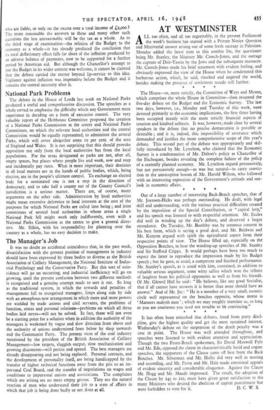National Park Problems
The debate in the House of Lords last week on National Parks produced a useful and comprehensive discussion. The speeches as a whole served to emphasise the difficulty which any Government must experience in deciding on a form of executive control. The very valuable report of the Hobhouse Committee proposed the creation of a National Parks Commission at the centre and National Parks Committees, on which the relevant local authorities and the central Commission would be equally represented, to administer the several Parks, which will cover altogether some so per cent. of the area of England and Wales. It is not surprising that this should provoke opposition not only from the local authorities but from the local populations. For the areas designated as parks are not, after all, empty spaces, but places where people live and work, sow and reap and incidentally pay rates. What is more important, their destinies in all local matters are in the hands of public bodies, which, being elective, are in the people's ultimate control. To exchange an elected body for a nominated one is not a' step in the direction of democracy, and to take half a county out of the County Council's jurisdiction is a serious matter. There are, of course, many arguments on the other side. Administration by local authorities might mean excessive deference to local interests at the cost of the purposes for which National Parks are called into being ; and joint committees of several local authorities in whose areas a single National Park fell might work only indifferently, even with a National Parks Commission at the centre to give a general direc- tive. Mr. Silkin, with his responsibility for planning over the country as a whole, has no easy decision to make.






























 Previous page
Previous page